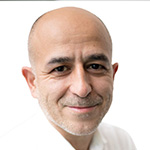TPS-Therapy for Alzheimer's dementia
Treating Alzheimer's dementia with TPS - a Forward-looking and Effective Therapy.
Alzheimer’s dementia is the most common neurodegenerative disease of our time, with a strong upward trend. Alzheimer’s dementia belongs to the group of dementia diseases, which include around 50 different variants of this degenerative disease of the brain, which is still incurable today. It is the most common form of dementia, accounting for about 65% of all cases. It is followed by vascular dementia and various mixed dementia forms with about 15%, then dementia types such as body Lewy dementia or frontotemporal dementia (Pick’s disease) and a whole number of other differentiable dementias.
The causes of all these diseases are not yet fully understood. In the past 20 years, Alzheimer’s research has focused primarily on beta-amyloids, which are formed by the agglutination of protein molecules on the nerve cells, but now scientists are increasingly focusing on tau fibrils, which attack the neurons internally. Numerous other hypotheses are under discussion and we will certainly learn many new things about the development of Alzheimer’s dementia in the coming years.
In the other dementia diseases, however, circulatory disturbances are in the foreground; more rarely, their causes or co-causes lie in hormone deficiencies, vitamin deficiencies, infections, metabolic diseases (e.g. diabetes mellitus) or craniocerebral injuries.
However, and in any case, all forms of dementia diseases, including Alzheimer’s dementia, are based on a disproportionate death of nerve cells, and the symtomatics of all forms of dementia are similar, although they differ in the order of their occurrence and in the time course.
Alzheimer’s dementia and other forms of dementia: Why are the numbers increasing so rapidly worldwide?
According to current epidemiological estimates, about 1.8 million people in Germany live with dementia disorders. On average, about 900 new cases occur every day. Over the course of a year, they add up to more than 300,000 cases. According to current studies, this number is expected to increase by 65% by 2050, affecting 2.8 million people in Germany. Worldwide, the number of people affected is expected to reach 153 million – a threefold increase.
Why the numbers are rising so sharply is, of course, the subject of research. According to the World Health Organization (WHO), one currently postulates in the following main causes:
- Higher life expectancy (i.e. natural degeneration in old age)
- Wrong diet or consumption of denatured foods, lack of exercise, stress, depression and much more.
- Diabetes mellitus, heart disease, high cholesterol, high blood pressure
- External influences: Toxins (heavy metals), drugs, air and water pollution
- Genetic factors
- Deficiency of mental activity
In addition, there are now also the consequences of the Corona pandemic, which are reflected in the form of long-covid, post-covid or in the field of neurological diseases as neuro-covid. Almost weekly, we are currently receiving studies and overarching meta-studies on this, which show us that we can expect the number of dementia diseases to increase exorbitantly.
Pharmaceutical research is in full swing, but a causal drug is not in sight
All dementia diseases currently have no cure. For more than 20 years, researchers have been working primarily on agents that would reduce the formation of beta-amyloid and promote its breakdown in people who already have the disease. However, so far all active substances have failed in the trials, although currently (as of January 2023) an antibody active substance called lecanemab is making scientists cautiously optimistic and they are working on approval in Europe. However, even lecanemab, which could in any case only be used for mild dementia, cannot halt the progression of dementia. Moreover, in addition to a marginal effect at best, the studies mainly found severe side effects, including deaths.
Safe and virtually free of side effects: transcranial pulse stimulation as a new treatment option
With shock wave therapy Transcranial Pulse Stimulation, a form of treatment has now been established away from drug research that can achieve extremely good and lasting improvements as a symptomatic Alzheimer’s dementia therapy.
Transcranial pulse stimulation is also characterized by the fact that it does not burden the human organism and so-called side effects, if any, consist of brief mild headaches or slight dizziness, which fades within a very short time. This concerns, so always new studies, investigations and also our experiences in the practices, however only approx. 2 of 100 patients.
Accordingly, TPS is also used with the same results in all other forms of dementia, whereby these are carried out individually as “off-label-use” therapies, since TPS was clinically approved in the first individual indication for “treatment of the central nervous system in Alzheimer’s dementia”. Further individual approvals will follow successively as the study situation expands.

